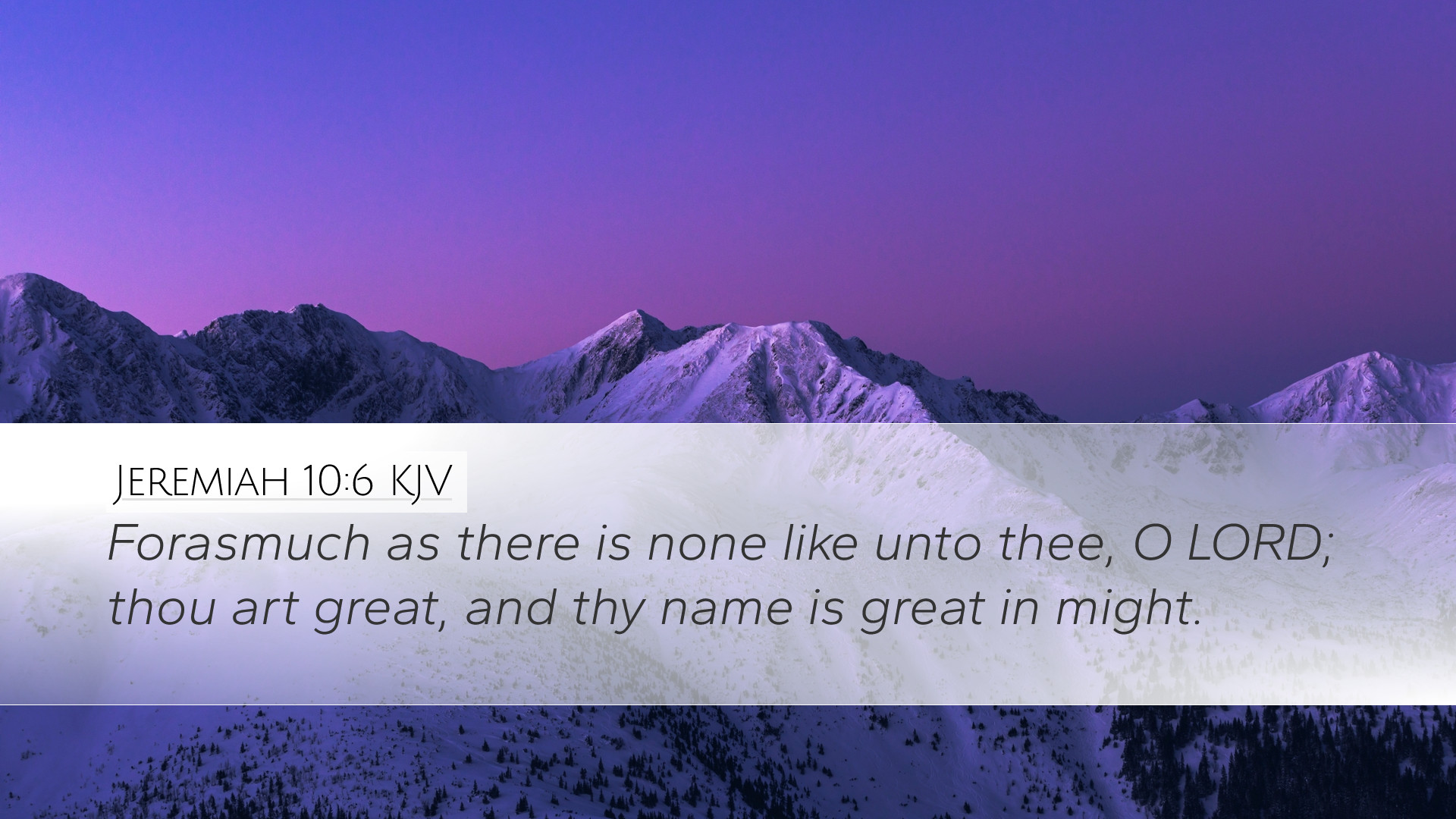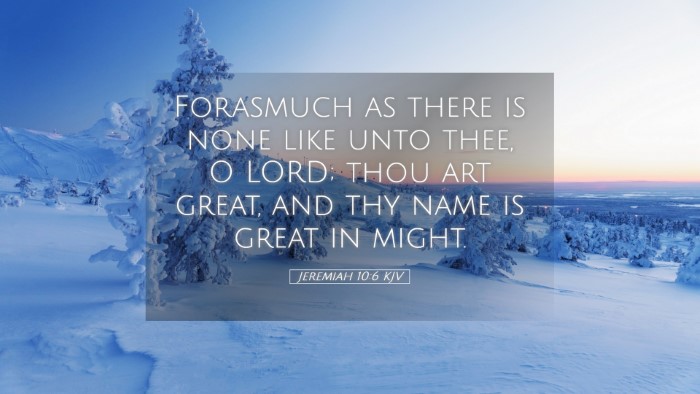Commentary on Jeremiah 10:6
Verse Text: "Forasmuch as there is none like unto thee, O Lord; thou art great, and thy name is great in might."
Introduction
This verse, Jeremiah 10:6, encapsulates a profound declaration of the uniqueness and greatness of God. It emphasizes the absolute lack of comparison to the Lord in terms of power and authority. Various public domain commentaries provide deeper insights into the implications of this verse, especially concerning idolatry, divine attributes, and the response of God's people to His greatness.
Insights from Matthew Henry
Divine Uniqueness
Henry begins his commentary by highlighting God's singularity. He notes that despite the world's diversity and the multiplicity of deities that people may worship, there is "none like unto" Jehovah. This statement serves as a stark reminder that the true God stands alone in His majesty.
God’s Greatness
He goes on to assert the greatness of God, emphasizing that His might cannot be measured. God's attributes—omnipotence, omniscience, and omnipresence—are set forth as characteristics that surpass human understanding and capabilities. Henry encourages believers to acknowledge this great power in their worship and daily lives.
Comparison with Idols
Henry contrasts the greatness of God with the futility of idols that the people of Israel were tempted to worship. He illustrates how idols, crafted by human hands, lack any power or substance. In light of God’s unmatched greatness, he urges Christians to remain steadfast in faith and reject false gods.
Insights from Albert Barnes
God's Name and Might
Barnes expounds on the phrase "thy name is great in might," explaining that God's name represents His character, authority, and the totality of His attributes. His might encompasses not only physical power but also moral excellence and covenant faithfulness.
Praise and Worship
He encourages believers to respond to God's greatness with appropriate reverence and praise. Recognizing that God is a God of action—who intervenes in human affairs with power—should deepen one's worship and encourage dependency on Him alone, rather than on worldly systems or idols.
Theological Reflection
Barnes also notes the theological implications of this verse, particularly in relation to God's sovereignty. Understanding that there is no other being or entity that holds the same power as God should foster both humility and confidence in believers. They are called to acknowledge God's authority and sovereignty over all creation.
Insights from Adam Clarke
Theological Affirmation
Clarke emphasizes the doctrinal aspect of this verse. He points out that acknowledging God's unparalleled greatness is fundamental to a correct understanding of theology. He elaborates on the necessary attributes of God that make Him unique—His eternity, immutability, and omnipotence.
Call to Action
Clarke urges pastors and teachers to emphasize God's supremacy in their preaching and teaching. This call is not just about understanding doctrine but also about embodying a lifestyle that reflects the reverence due to such a great God. The enormity of God warrants a life of obedience and devotion.
The Practical Application
In the context of modern times, the commentary from Henry, Barnes, and Clarke serves as a pertinent reminder for today's believers. The glitz of modern idols—materialism, personal achievements, and societal acceptance—often distracts from recognizing and worshiping the true God.
The Role of Worship
Martin's reflection on worship stemming from an understanding of God’s greatness enhances the collective worship experience of a community. When congregations gather, they must be reminded of God’s essence; true worship can only spring forth from an acknowledgment of His unique might.
Conclusion
Jeremiah 10:6 stands as a powerful proclamation of God’s unmatched greatness. Through the insights of Matthew Henry, Albert Barnes, and Adam Clarke, we appreciate the significance of proclaiming God's sovereignty and power. This verse invites believers to live in a way that reflects deep reverence for the Lord, to reject the temptation of modern idols, and to engage in worship that affirms His unparalleled majesty. In doing so, we grow in our relationship with Him, recognizing that He alone is God, worthy of all honor and glory.


